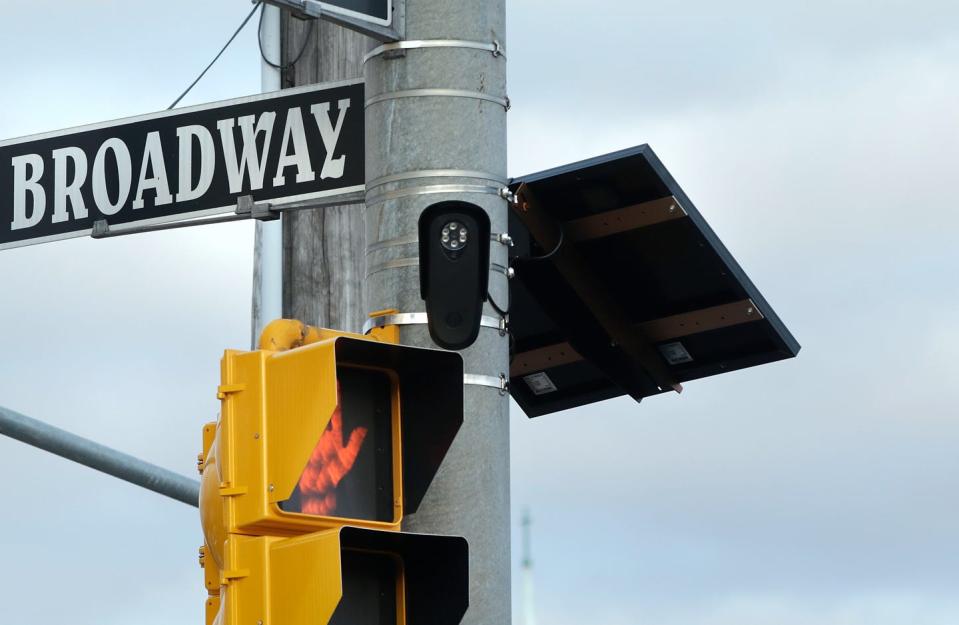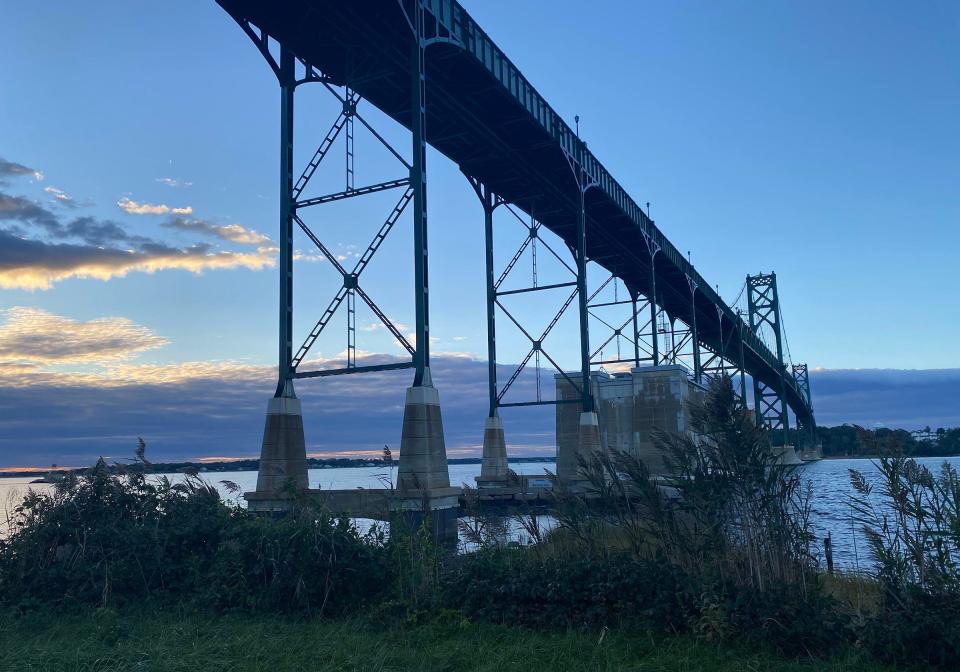Portsmouth voted down Flock cameras on Mount Hope Bridge. Why they might go up anyway.
Editor's note: This story was updated to correct the erroneous statement that Providence police would be sharing data collected from the Flock system with other communities currently employing the system in R.I. Providence police will not be sharing data with any other agencies.
PORTSMOUTH — As soon as the Portsmouth Town Council rescinded its approval of the police department’s request to collaborate with Bristol on a pilot program calling for the installation of two automated license plate reading cameras near each end of the Mount Hope Bridge, Bristol Police Chief Kevin Lynch got the ball rolling on negotiations with the Rhode Island Turnpike and Bridge Authority to place the Portsmouth cameras on state property instead.
The town rescinded its approval of the program on Wednesday, July 13. Lynch told The Daily News on the following Tuesday, July 19:
“I haven’t given up; the town council approval in Bristol still stands, there’s been absolutely no wavering from the council here…it was a Bristol initiative with the goal of having two on the Portsmouth side and two on the Bristol side, so we are readjusting the plan – we are reaching out to the Bridge and Turnpike Authority to see if they will partner with us in lieu of Portsmouth, and we’re in that conversation right now about the benefits of the program.”

He indicated that he has asked for the cameras, which had originally been proposed for two locations on town property at Bristol Ferry Road and Boyd’s Lane, to instead be installed on RITBA property, essentially affixed directly to both sides of the southern end of the Mount Hope Bridge.
RITBA spokesperson Cara Cromwell declined to address questions about whether or not the town of Portsmouth would be looped into the ongoing communications between the town of Bristol and RITBA, the nature of those communications, or whether RITBA was taking into account the Portsmouth Town Council’s clear opposition to the placement of two Flock Safety ALPR cameras within the borders of their municipality. She also declined a request to be interviewed over the phone.
However, she did deliver the following statement via email, which thus far represents the full extent of RITBA’s public comment on the matter: “I can confirm that Bristol Police did reach out. RITBA is doing its due diligence to determine if this solution would enhance our already robust video analytics system.”
Flock cameras: Measure to prevent suicides from Mount Hope Bridge draws concerns from ACLU. Here's why.
Setting aside the burning question of what exactly that “already robust video analytics system” is, the pilot program in question was pitched by the Bristol and then the Portsmouth Police Departments to their respective town councils as being primarily for suicide prevention, the theory being when the police have been issued a "Be on the lookout” alert for any vehicle associated with mental health or suicide risk, the license plate could be plugged into the Flock Safety database of photos continuously captured by the cameras. The system would then send an immediate alert if that vehicle passed one of the cameras, and the technological enhancement to the existing BOLO process would cut down police response time to potential suicide attempts on the Mount Hope Bridge.
While Lynch did tell The Daily News that he would still be interested in installing the cameras even if their use were limited to strictly suicide prevention purposes – given his department’s initial characterization of the program as being specifically for suicide prevention, it is noteworthy that their intended use is not in fact strictly limited to that purpose – his department’s ALPR policy as it is presently written includes a litany of crime prevention and law enforcement applications for the cameras, which is what they are typically marketed for and what they are used for in Cranston, Glocester, Lincoln, Smithfield, Tiverton, Woonsocket, Providence (within the next 60 days), and over 1,500 other communities around the United States.

Many R.I. police departments share their Flock data with each other, meaning a license plate search by a Pawtucket police officer, for instance, could result in “hits” not only from the cameras in Pawtucket but also from Flock cameras located in other RI municipalities. Lynch told The Daily News that Bristol would not be automatically sharing data with other municipalities, indicating that he would personally evaluate every request from other departments for data from Bristol’s cameras and decide whether to share the information on a case-by-case basis.
Portsmouth reconsiders Flock cameras: How Portsmouth councilors voted after comments against Mount Hope Bridge license plate readers
When Josh Thomas, Flock Safety’s vice president of local government affairs and external communications, came to Providence recently to participate in a joint press conference with Mayor Jorge Elorza and the Providence Police Department announcing the city would be moving ahead with the activation of 25 Flock cameras despite a city council resolution requesting more time to review the plan, he provided the Providence Journal with the following list of RI municipalities currently using Flock cameras: Bristol, Cranston, Glocester, Lincoln, Smithfield, Tiverton and Woonsocket. Flock officials later clarified that those communities currently employ the Flock system but "Providence PD will actually not be sharing data with any other agencies right now."
The RI ACLU has repeatedly criticized Flock Safety and the municipalities partnering with it for implementing such widespread, pervasive, and unregulated surveillance technology, and has posited the necessity of town ordinances and state legislation to strictly control its use. In its July 11 letter to the Portsmouth Town Council, the RI ACLU stated, “An ordinance could include specific protections similar to those contained within 22 – H 7507 and 22 – S 2650, legislation that was introduced in the Rhode Island legislature this year to address this technology.” Both of those bills died in committee and would have to be reintroduced as new bills in the legislature’s next session.
“I think as we're seeing more municipalities implement this technology, it really underpins the need for these really robust regulations and these legally enforceable standards for this technology,” said RI ACLU policy associate Hannah Stern. “If we have this tech that’s expanding rapidly across municipalities across our state, I think that only emphasizes how important it is to put in a statewide, codified statue which ensures that this technology is not becoming more expansive or being misused or being used in ways that are really compromising people’s civil liberties."
Flock cameras in Providence: Providence deploys surveillance cameras but vows civil liberties won't be violated
Despite the concerns of those who share the ACLU’s perspective on privacy and surveillance, the Flock cameras continue to gain traction with police chiefs and municipal officials as their users collect data proving them to be effective crime prevention tools. RI Attorney General Peter Neronha stated in a July 28 interview on WPRO that the state, “has solved or is in a position to solve shootings based on leads that have come from these cameras – drive-by shootings.” He cited a not yet public case the state cracked in recent weeks by locating a suspected vehicle with a Flock camera.
Cranston, whose police department both the Bristol and Providence police consulted with before deciding to pursue the cameras, has produced data showing the cameras they installed in August 2021 have already helped recover 40 stolen vehicles, locate seven missing persons, and make 42 stolen vehicle arrests, 24 wanted persons arrests and 11 stolen property arrests.
Alongside the surveillance debate, the Bristol pilot program’s stated goal of suicide prevention has drawn a divided response from local groups who work in suicide prevention and mental health advocacy. EBCAP and the Patton Foundation support the program and agreed to fund it after Bristol Police approached them through the Bristol Health Equity Zone. According to Lynch, both organizations remain committed to funding the program in whatever final form it takes.
Previous coverage: Portsmouth to reconsider ALPR camera program as suicide prevention advocates speak out
Bridging the Gap, which advocates for physical barriers on the bridges, has publicly come out against the cameras, saying they are not an effective solution and will not prevent people from jumping off the bridge. The Bristol Police Department has also testified in front of the state legislature in favor of barriers, Chief Lynch doesn’t see the two solutions as mutually exclusive, voicing his conviction that the suicide risk posed by the Mount Hope Bridge is a problem that requires a litany of coexisting solutions and stating he will do “whatever he can to save even one life.”
The town council was recently made aware of Bristol Police’s communication with RITBA by a town resident. It is not clear if the council has received any notice from RITBA, the town of Bristol or its police department. If the Bristol Police are successful in their negotiations with the state to circumvent the decision of their neighboring town’s elected officials, the citizens of Portsmouth will end up driving past two ALPR cameras on their way into Bristol whether they like it or not, even after some citizen groups successfully lobbied the council to reverse its initial approval of the program.
Lynch made it clear that even a denial from RITBA to affix the cameras directly to state property on the Aquidneck Island side of the Mount Hope Bridge would not be the end of his efforts to acquire and install Flock cameras in Bristol and Portsmouth, saying, “I’m waiting (to hear) from the Bridge and Turnpike Authority…if there is a denial, obviously I’ll have to go back to the drawing board and come up with another program and another plan, but I’m prepared to do that if I have to. I’m hoping I can partner with the Bridge and Turnpike Authority.”
This article originally appeared on Newport Daily News: License plate reading cameras on Mount Hope Bridge remain possibility

